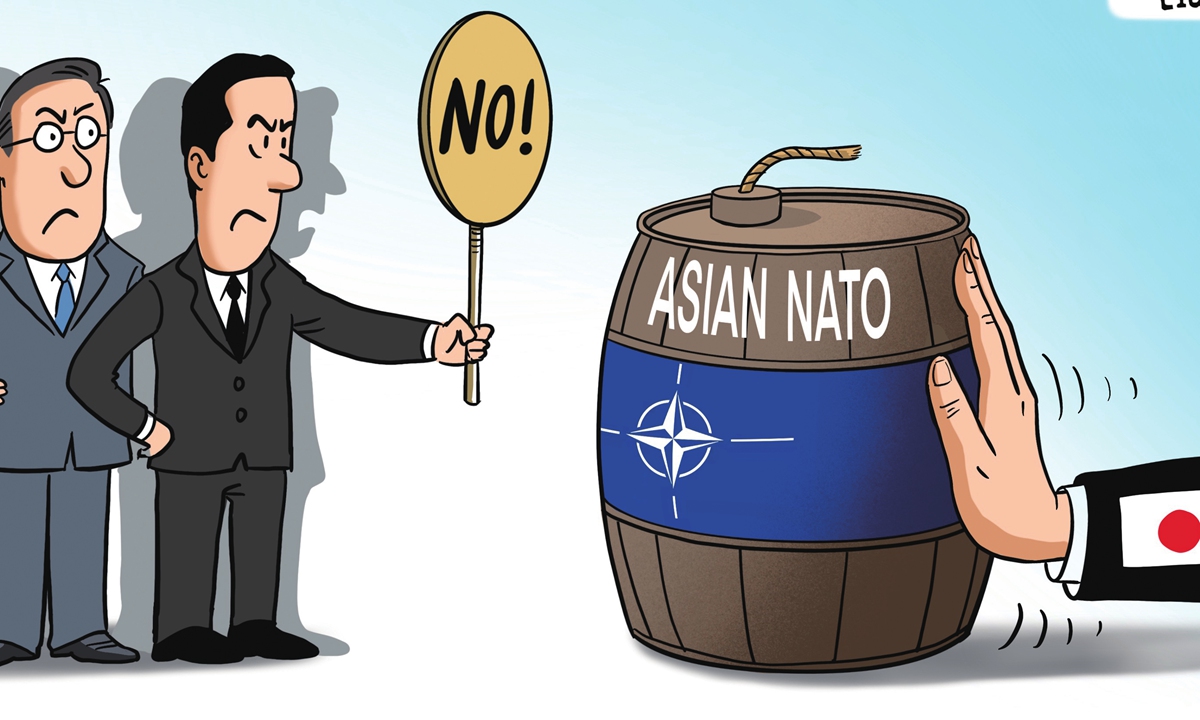Oct 09, 2024, 21:37

Illustration: Liu Rui/GT
(Global Times)New Japanese Prime Minister Shigeru Ishiba is set to make his diplomatic debut this week at a series of summits related to ASEAN in Vientiane, Laos. It's noticeable that before his visit, his repeated advocacy for an "Asian NATO" has been met with skepticism, raising alarms in the region.
On October 5, Indonesia's largest English-language newspaper, The Jakarta Post, published an editorial entitled "No to Asia's NATO," directly advising Ishiba to "refrain from promoting his grand idea to establish an Asian version of NATO in order to avoid self-humiliation." "ASEAN will not buy into Ishiba's idea about an Asian NATO. As a group, ASEAN needs Japan as a reliable trading and economic partner, not a military ally that would only exacerbate tensions in the region," the article stated. These voices underline the common aspiration of ASEAN countries for development and peace.
Before Ishiba was elected the president of the Liberal Democratic Party of Japan on September 27, he bluntly claimed that "the creation of an Asian version of NATO is essential to deter China by its Western allies." He also reiterated that "the absence of a collective self-defense system like NATO in Asia means that wars are likely to break out because there is no obligation for mutual defense." However, the reality is that NATO, as a confrontational military organization, has caused turmoil in Europe. The "collective self-defense system" has not protected the European continent; instead, it has dragged it into chaos and instability.
Japan's push for an "Asian NATO" threatens to disrupt decades of prosperity and stability in the Asia-Pacific region. Establishing an "Asian version of NATO" would inevitably force regional countries to take sides. However, most Asian countries, especially those in South and Southeast Asia, do not wish to engage in regional confrontations. The "Asian NATO" strategy will only create divisions in the Asia-Pacific region and resurrect past patterns of bloc politics. Given that the Asia-Pacific is a critical engine of global economic development, this approach could lead to increased instability and dim the prospects for economic cooperation. Therefore, the "Asian NATO" fundamentally contradicts the aspirations of Asian countries for development.
In recent years, Japan has increasingly relaxed its military restrictions and expanded its armaments, showcasing military strength. The "Asian NATO" initiative represents Japan's further attempt to break free from the constraints of its pacifist constitution and exclusively defense-oriented policy, which is a significant concern for neighboring countries, said Lü Chao, a research fellow on Northeast Asia studies at the Liaoning Academy of Social Sciences.
An unwelcome proposal to countries in the region, Ishiba's "Asian NATO" concept appears more like an impractical "daydream" that is unlikely to materialize. Japan would be better off abandoning this self-humiliating radical idea. At this week's ASEAN summits, Southeast Asian countries hope to hear from the new Japanese prime minister not about topics of confrontation and division, such as an "Asian NATO," but rather about how to promote regional stability and prosperity through dialogue and cooperation.
Community login






Add a comment